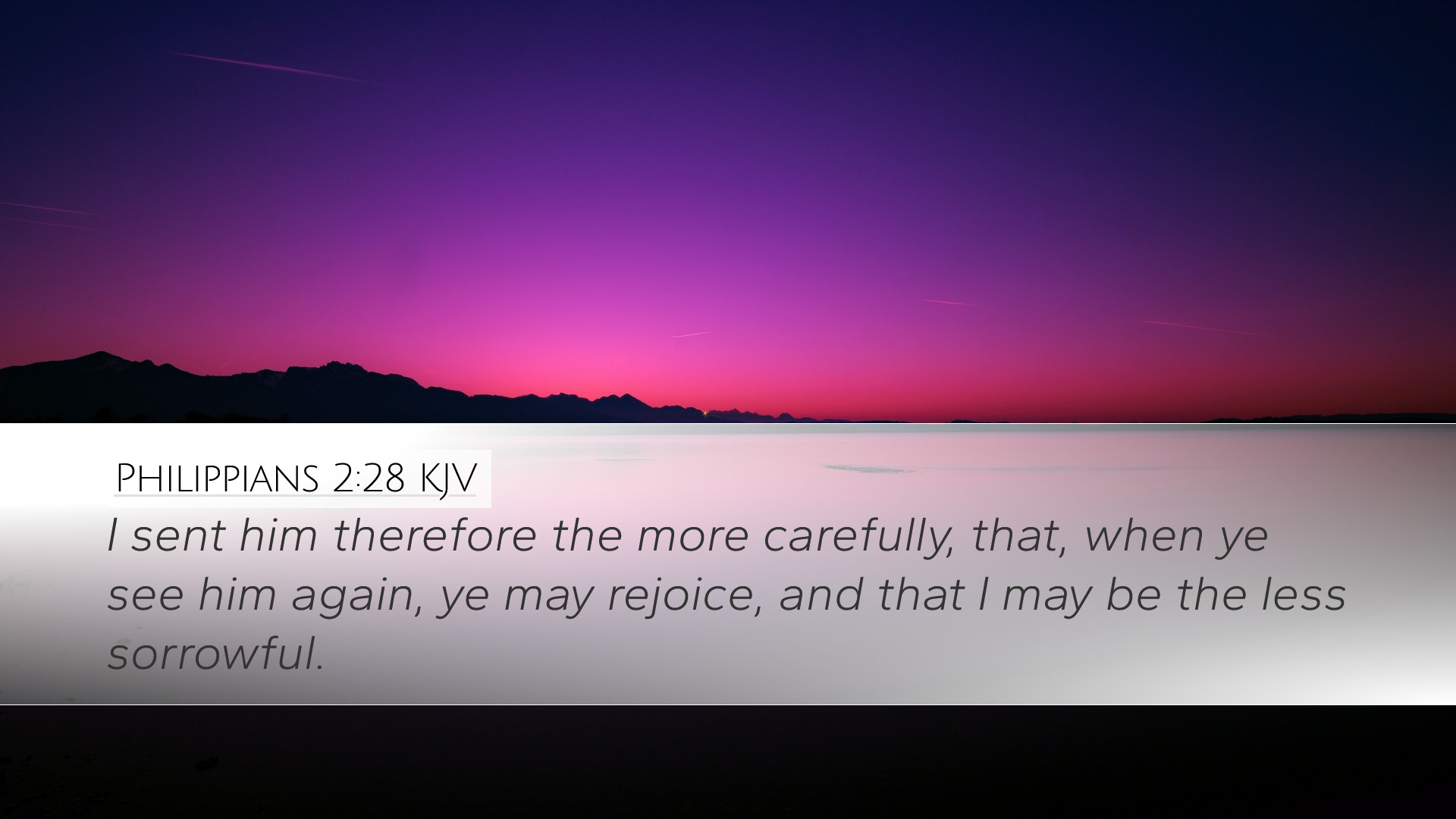Commentary on Philippians 2:28
Verse: "I send him therefore the more carefully, that, when ye see him again, ye may rejoice, and that I may be the less sorrowful."
Introduction
Philippians 2:28 forms part of Paul’s letter to the church in Philippi, expressing his deep relational ties with the believers there. The verse reflects Paul’s pastoral concern for the congregation, demonstrating both his affection for them and his sorrow over their trials. This careful sending of Epaphroditus back to Philippi is filled with theological and pastoral implications that merit close examination.
Historical Context
The Apostle Paul wrote this letter during his imprisonment, a time where he experienced both personal suffering and the burden of concern for the Christian communities he had established. Epaphroditus had been sent by the Philippians as a messenger and servant to Paul, bringing help to him in his time of need (Philippians 4:18). His swift return implicates significant aspects of early Christian community life, reflecting the challenges and unity experienced in the burgeoning church.
Analysis of the Text
Paul's affection for the Philippians is evident in his intent to send Epaphroditus back to them. As Matthew Henry notes, this verse shows the Apostle's earnest desire for the church's joy and support in their struggles. He is careful in his sending, aware that their interaction with Epaphroditus will not merely be a greeting, but an important moment of rejoicing amidst challenges.
Grammatical Structure
In examining the Greek text, the use of “more carefully” emphasizes Paul’s attentiveness to the needs and context of the Philippians. He desires, as Albert Barnes mentions, that they receive Epaphroditus not just as a messenger but as a source of spiritual strength and encouragement.
Theological Implications
This verse points to a broader theological insight regarding the relationship between suffering and joy in the Christian experience. Adam Clarke elaborates on how Paul acknowledges the collective sorrow of the church, which he himself feels deeply. The sending of Epaphroditus is meant to alleviate sorrow—both his own and that of the Philippians—through the joy of reunion.
Pastoral Applications
Paul's carefulness in sending Epaphroditus calls pastors and church leaders to reflect on their roles within the community. Here are some applications to consider:
- Encouragement in Service: Leaders should encourage their congregants by facilitating connections and serving together, thus fostering unity within the body of Christ.
- Personal Touch: Like Paul, church leaders are reminded to consider the emotional and spiritual implications of their actions on the community.
- Joy in Reunions: The anticipation of rejoicing is paramount; church life should aim at building relationships that bring joy and support amid adversity.
Conclusion
Philippians 2:28 transcends a mere personal commendation of Epaphroditus; it encapsulates Paul’s profound connection with the Philippian church, underscoring the essential balance of sorrow and joy in Christian fellowship. For pastors, students, and theologians, this verse impels a deeper understanding of how relational dynamics operate within the church and serves as a model for pastoral care that intertwines heartfelt emotion with theological integrity.
Further Reflection
As believers engage with this passage, it invites them to reflect on their own responses to one another's needs, the joys of ministry, and the sorrow of separation that can arise. Such reflections can lead to a richer, more empathetic approach to community life, echoing Paul’s model of leadership in love and care.


